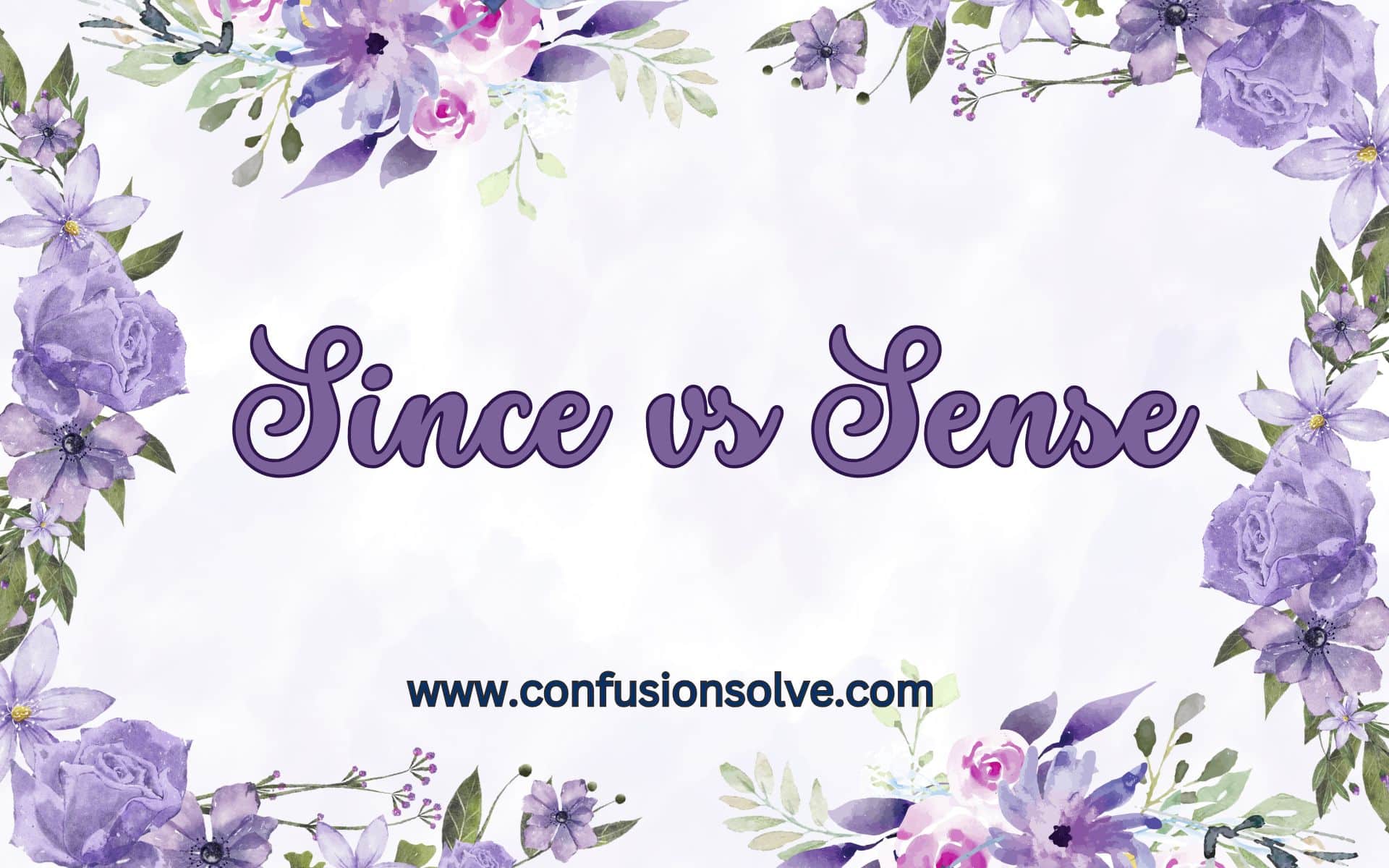Words can be tricky, especially when they sound alike but mean entirely different things. Take **since** and **sense**, for example. One helps you track time, while the other connects you to the world through perception.
Mix them up, and your sentence might leave readers scratching their heads. Whether you’re writing an email, crafting a blog post, or chatting with friends, knowing the difference between these two words is essential.
This guide will break it all down for you, from definitions and examples to common mistakes and tips. By the end, you’ll never confuse **since** and **sense** again—guaranteed. Let’s dive in and master these words once and for all!
What is the Difference Between Since and Sense?
The words since and sense may sound alike, but they have completely different meanings. Since is used to indicate time or reason. For example, “I haven’t seen her since yesterday” refers to time, while “Since it’s raining, we’ll stay indoors” explains a reason. On the other hand, sense refers to perception, understanding, or intuition. For instance, “My sense of smell is strong” describes a physical ability, and “It makes sense to save money” shows logical understanding.
To make it easier, here’s a quick comparison:
| Word | Meaning | Example |
| Since | Time or reason | “I’ve been here since 10 AM.” |
| Sense | Perception or understanding | “I have a sense of direction.” |
You may also like:Privilege vs Priviledge: Understanding the Correct Spelling
How to Use Since Correctly in a Sentence
Using since correctly is all about context. When you’re talking about time, like “I’ve been working here since 2020,” it marks the starting point of an ongoing action. If you’re explaining a reason, such as “Since it’s raining, we’ll stay indoors,” it works like “because.” Both uses are common in everyday language.
Here are a few more examples:
- Time: “She hasn’t called since last week.”
- Reason: “Since you’re here, let’s get started.”
Remember, since always ties to time or logic. If your sentence doesn’t involve either, you might be using the wrong word.
How to Use Sense Correctly in a Sentence
The word sense is versatile and can describe physical perception, understanding, or intuition. For example, “Dogs have a strong sense of smell” refers to a physical ability, while “It makes sense to save money” shows logical understanding. You can also use it to describe intuition, like “I sense trouble ahead.”
Here are some examples to help you:
- Physical sense: “My sense of taste is very sensitive.”
- Understanding: “This plan makes perfect sense.”
- Intuition: “I sense that something is wrong.”
Using sense correctly adds clarity and depth to your writing.
Since vs. Sense: Pronunciation and Spelling
One reason people confuse since and sense is their similar pronunciation. However, there’s a slight difference. Since is pronounced /sɪns/ (rhymes with “mince”), while sense is pronounced /sɛns/ (rhymes with “fence”). Paying attention to this small difference can help you avoid mistakes.
Spelling is another area where errors occur. Remember, since has an “i,” while sense has an “e.” A simple trick is to associate since with time (both have an “i”) and sense with perception (both have an “e”).
You may also like:Other Than or Other Then: Which is Correct?
Common Mistakes with Since and Sense
Mixing up since and sense is a common mistake, even for native English speakers. For example, saying “I haven’t seen her sense yesterday” is incorrect—it should be “since.” Similarly, “It doesn’t since to argue” is wrong; the right word is “sense.”
Here’s how to avoid these errors:
- Use since for time or reason.
- Use sense for perception or understanding.
- Practice with examples to reinforce learning.
The Etymology of Since and Sense
The word since comes from Old English “sīththan,” meaning “after.” Over time, it evolved to indicate time or reason. On the other hand, sense derives from Latin “sensus,” meaning “perception.” Both words have rich histories that explain their current meanings.
Understanding their origins can help you remember their correct usage. For example, since’s connection to time makes it easier to associate with dates or reasons, while sense’s link to perception ties it to feelings or understanding.
Since: Indicating Time and Reason
The word since has two primary uses. First, it can indicate time, like “I’ve been here since 8 AM.” Second, it can explain a reason, such as “Since you’re here, let’s start the meeting.” Both uses are essential in everyday communication.
Here are some examples:
- Time: “She’s been working here since 2018.”
- Reason: “Since it’s late, let’s finish tomorrow.”
Using since correctly ensures your sentences are clear and precise.
Sense: Perception, Understanding, and Intuition
The word sense is all about perception and understanding. It can describe physical abilities, like “My sense of hearing is sharp,” or abstract concepts, like “It makes sense to plan ahead.” It can also refer to intuition, such as “I sense something is wrong.”
Here are a few examples:
- Physical sense: “His sense of touch is very sensitive.”
- Understanding: “This explanation makes perfect sense.”
- Intuition: “I sense that she’s hiding something.”
Using sense correctly adds depth to your writing and helps you express ideas clearly.
Examples of Since and Sense in Everyday Language
Let’s look at some real-life examples to see how since and sense are used:
- Since: “I haven’t seen him since last year.”
- Sense: “She has a great sense of style.”
These examples show how since ties to time or reason, while sense relates to perception or understanding.
Since vs. Sense: Synonyms and Alternatives
If you want to vary your vocabulary, here are some synonyms:
- Since: Because, from the time, as.
- Sense: Perception, feeling, intuition.
For example:
- “Because it’s raining, we’ll stay indoors.” (Instead of “Since it’s raining…”)
- “I have a feeling something is wrong.” (Instead of “I sense something is wrong.”)
The Role of Since and Sense in Content Writing
Using since and sense correctly is crucial in content writing. Misusing them can confuse readers and harm your credibility. For example, “Since the start of the project, we’ve made progress” is correct, while “Sense the start of the project…” is not.
Since and Sense in Professional Writing
In professional writing, it’s crucial to use the correct words to convey your message clearly and accurately. Two words that are often confused are “since” and “sense.” Here’s a breakdown of their meanings and proper usage:
Since
- Meaning:
- As a conjunction: Indicates a reason or cause (similar to “because”).
- As a preposition: Refers to a point in time starting from a specific moment in the past until now.
- Examples:
- Conjunction: “Since the project deadline is approaching, we need to work overtime.”
- Preposition: “She has been with the company since 2015.”
Sense
- Meaning:
- Refers to perception, understanding, or awareness (e.g., the five senses: sight, hearing, touch, taste, smell).
- Can also mean a feeling or intuition about something.
- Examples:
- “The new policy makes sense and aligns with our goals.”
- “She has a strong sense of responsibility.”
Key Difference
- Since relates to time or causation.
- Sense relates to perception, understanding, or feeling.
Common Mistakes
- Incorrect: “I haven’t heard from them sense last week.”
- Correct: “I haven’t heard from them since last week.”
- Incorrect: “Since the meeting was unclear, I lost my since of direction.”
- Correct: “Since the meeting was unclear, I lost my sense of direction.”
You may also like:Shiny vs Shiney – Which Form is Correct?
Since and Sense in Academic Writing
In academic writing, precision matters. Using since and sense correctly helps you convey your ideas effectively. For example, “Since the experiment began, we’ve observed changes” is accurate and appropriate.
How to Avoid Confusing Since and Sense
Here are some tips to avoid confusion:
- Remember since for time/reason and sense for perception.
- Practice with examples to reinforce learning.
- Double-check your writing for errors.
Since and Sense: Impact on SEO and User Experience
Using since and sense correctly isn’t just about grammar—it’s about creating content that ranks well and engages readers. When you mix up these words, it can confuse your audience and harm your SEO. For example, writing “I haven’t seen her sense yesterday” instead of “since yesterday” can make your content look unprofessional. Search engines prioritize clear, error-free content, so using the right word boosts your rankings. Plus, readers stay engaged when your writing is easy to understand. Clear communication equals better SEO and happier users.
Since and Sense: Common Misused Word Pairs
Since and sense aren’t the only words that trip people up. Other commonly confused pairs include affect vs. effect and their vs. there. For instance, “affect” is usually a verb (e.g., “The weather affects my mood”), while “effect” is a noun (e.g., “The effect of the storm was huge”). Similarly, “their” shows possession (e.g., “Their house is big”), and “there” refers to a place (e.g., “The book is over there”). Mastering these distinctions improves your writing and avoids confusion.
Since and Sense in Psychology and Education
In psychology, sense often describes perception or intuition, like “a sense of belonging.” Meanwhile, since is used to track time in studies, such as “Since the program started, students have improved.” For example, researchers might say, “Since the experiment began, participants have shown better focus.” Using these words correctly ensures your writing is accurate and professional, whether you’re discussing mental health or educational progress
Since and Sense: A Guide for Non-Native English Speakers
For non-native English speakers, mastering since and sense can be tricky. The key is practice. Focus on pronunciation: since (/sɪns/) rhymes with “mince,” while sense (/sɛns/) rhymes with “fence.” Use examples like “I’ve been here since noon” and “I have a sense of direction” to reinforce learning. Over time, you’ll get the hang of it. Remember, even native speakers make mistakes, so don’t be afraid to ask for help or use tools like grammar checkers.
Since and Sense: Tips for Clear Communication
Clear communication starts with using the right words. For example, “Since you’re here, let’s start” is clear and concise. On the other hand, “Sense you’re here, let’s start” is confusing. To avoid mistakes, remember: since is for time or reason, and sense is for perception or understanding. Whether you’re writing an email, giving a presentation, or chatting with friends, using these words correctly ensures your message is understood.
You may also like:Momma or Mama: Which One is Correct? A Complete Guide
Since vs. Sense: A Complete Breakdown
To wrap it up, since refers to time or reason, like “I’ve been here since morning.” Sense relates to perception or understanding, such as “It makes sense to save money.” Mastering their usage ensures your writing is clear, professional, and effective. Whether you’re a student, professional, or casual writer, understanding these differences is a small step that makes a big impact. Keep practicing, and soon, using since and sense correctly will feel like second nature.
Conclusion
Mastering the difference between since and sense is easier than you think. Since ties to time or reason, like “I’ve been here since morning,” while sense relates to perception or understanding, such as “It makes sense to plan ahead.” By paying attention to context and practicing with examples, you can avoid common mistakes and communicate clearly.
Whether you’re writing an email, crafting a blog, or having a conversation, using these words correctly boosts your credibility. Keep this guide handy, and you’ll never mix up since and sense again. Happy writing!
Meta
“Since vs. Sense: Learn the difference, usage, and avoid mistakes. A quick guide for confident writing!”
FAQs
- What is the difference between sense and since?
“Sense” relates to perception or understanding, while “since” refers to time or reason. - How do you use sense?
Use “sense” as a noun (e.g., “common sense”) or verb (e.g., “I sense something wrong”). - Where do we use since?
Use “since” for time (e.g., “since Monday”) or reason (e.g., “since you agreed”).
Which is correct, sense or sence?
“Sense” is correct; “sence” is a misspelling.










